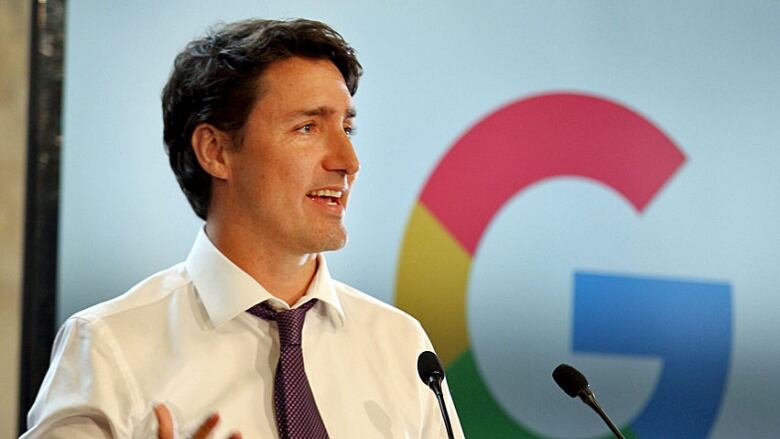Memo to PM: Davos heavy hitters know all about Canada
It's a PM's job to cheerlead, especially on the world stage, but there is real work at home, no?

Whatever Justin Trudeau has to say at Davos, it will no doubt be inclusive and delivered in the spirit of diversity and working together with all of humanity, building the kind of future not just for Canadians, but for everyone on this planet that we know people expect, because Canada must be a positive voice on the world stage.
Actually, the grammatically dubious last half of that paragraph was assembled directly from Trudeau quotes uttered just after he was elected.
He says stuff like that all the time; it's fairly meaningless, but Canadians lick it up.
Whenever the inevitable post-election hangover starts to set in, people just insufflate another dose of Trudeau sunniness, and the euphoria about Stephen Harper no longer being in charge of anything seems to return for a little bit longer.
- Trudeau's cabinet retreat stays on track until the end, almost
- Canada not invited to anti-ISIS coalition meeting
- Ottawa may ante up more cash for infrastructure
- Bank of Canada faces key rate decision Wednesday
Trudeau still tops popularity polls here by a long chalk. In other countries, people are still talking about how handsome he is, and how good he and Sophie looked in Vogue, and, rather embarrassingly, how he's making Canada hip.
Which is no doubt why he's been given the juicy gig of a keynote address to the World Economic Forum in Davos this week. The people who really run the world want a closer look at him.
In return, the prime minister apparently thinks he can lever the glamour and bring back something a little more concrete from Davos than more rave reviews.
His advisers are telling reporters he'll be pitching "the heaviest hitters imaginable" to invest in Canada.
Given our badly weakened currency, our stuff is dirt cheap now for anybody with a bag of American dollars or euros.
Plus, Canada is, you know, just a great place.
"We're going to talk about how diversity is a strength and really showcase the fact that Canada has tremendous opportunities and is facing challenges like lots of places, but we have the tools to surpass those challenges in a way that should draw in global interest," Trudeau said Tuesday before leaving the federal cabinet retreat in St. Andrews, N.B.
Economy alert
Now, prime ministers have to cheerlead; they all do. But Trudeau's ineluctable happy talk is beginning to sound a bit detached from certain realties that the unimaginably important heavy-hitters in Davos are probably quite aware of.
As Trudeau was wrapping up his Maritime retreat on Tuesday, two pieces of news hit:
Potash Corp. announced it is suspending the Picadilly mine in N.B., along with more than 400 jobs; and the Parliamentary Budget Office, which tortures politicians with cold rushes of reality, reported that Canadians are headed towards being the most indebted population in the G7.

For every $100 of income, the average Canadian household now carries $171 in debt obligations, a trend curve that's been rising since 2000.
(And of course a large percentage of households carry no debt at all, meaning the average load of those who do have debts is much higher).
What this means is that if there is a market correction coming in Canada's biggest urban housing markets, Canadians have never been less capable of withstanding it.
Unemployment here is above seven per cent; it's five per cent in the U.S. Our productivity lags behind the U.S.
And that crashing Canadian dollar, while advantageous to exporters, will inevitably mean a higher cost of living for just about everybody.
Enough red carpets?
Presumably, if there is a huge advantage to investing in Canada, the moneyed elite meeting in Switzerland know it. They have people to tell them those things.
And Trudeau has other, more urgent matters to deal with.
He must decide how much stimulus spending is appropriate, and quickly. (A modest suggestion: perhaps we could do away with interprovincial trade barriers and perhaps actually enhance the free movement of goods and services with the U.S. Wouldn't that be good for productivity?)
The government also has some pretty complicated, expensive election promises to fulfill.
There also appears to be some disapproval out there of the PM's mournful but non-belligerent response to the slaughter of six Quebeckers by Islamists in Burkina Faso, including a scolding from the mother of one of the victims.
Canada is, in fact, now excluded from high-level international meetings about how to conduct the campaign against ISIS (probably because Trudeau's government is committed to withdraw Canadian fighter jets from the air war over Iraq and Syria).
Perhaps the prime minister thinks it's rather pointless to continue in an air war that everyone knows cannot be won on its own, without a ground invasion. If he does, he should probably say so.
Anyway, boosting Canada abroad can't hurt. But really, isn't this just another Justin Trudeau red carpet turn?

And come March he'll be off to bask at a state dinner in the White House, an honour that was never offered to Stephen Harper.
Good for him.
I am not among the minority of Canadians suffering from Trudeau Derangement Syndrome, the people who try to turn every comment section on every news site in the country into a repository for Trudeau-hate bile.
But, by now, we must all have internalized that there is value in diversity, and that we must work together as Canadians, and that we are an incredible, wonderful, virtuous place.
We also have problems, though. Time to get at them, no?

